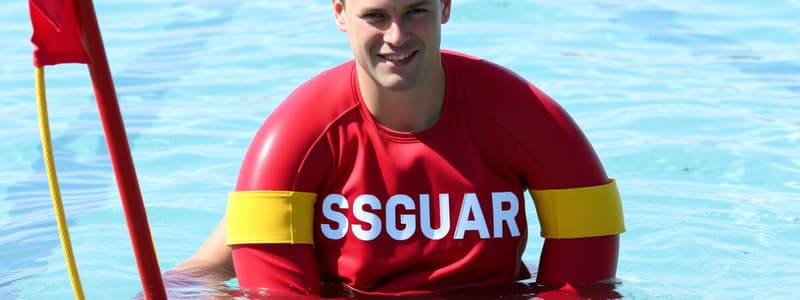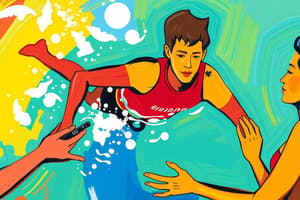Podcast
Questions and Answers
What is the primary responsibility of a lifeguard?
What is the primary responsibility of a lifeguard?
To prevent drowning and other injuries from occurring at their aquatic center.
Which of the following are characteristics of a lifeguard? (Select all that apply)
Which of the following are characteristics of a lifeguard? (Select all that apply)
- Courteous and consistent (correct)
- Undisciplined
- Mature (correct)
- Knowledge and skilled (correct)
- Positive (correct)
- Reliable (correct)
Lifeguards should be inattentive while on surveillance duty.
Lifeguards should be inattentive while on surveillance duty.
False (B)
What steps should a lifeguard take when obtaining consent from an injured or ill person before providing care?
What steps should a lifeguard take when obtaining consent from an injured or ill person before providing care?
What is the validity period of an American Red Cross lifeguarding certification?
What is the validity period of an American Red Cross lifeguarding certification?
What does EAP stand for?
What does EAP stand for?
What personal protective equipment should a lifeguard have?
What personal protective equipment should a lifeguard have?
What equipment should be worn or carried by a lifeguard at all times while on duty?
What equipment should be worn or carried by a lifeguard at all times while on duty?
What safety equipment/items should a lifeguard have easy access to while on duty?
What safety equipment/items should a lifeguard have easy access to while on duty?
What are lifeguards responsible for?
What are lifeguards responsible for?
Give examples of common rules and regulations often posted at an aquatic facility.
Give examples of common rules and regulations often posted at an aquatic facility.
Flashcards
Lifeguard's Primary Responsibility
Lifeguard's Primary Responsibility
To prevent drowning and injuries and enforce facility rules.
Qualities of a Good Lifeguard
Qualities of a Good Lifeguard
Knowledge, skill, reliability, maturity, courtesy, and a positive attitude.
Lifeguard Surveillance
Lifeguard Surveillance
Remaining attentive, upright, and actively scanning the water.
Steps to Obtain Consent
Steps to Obtain Consent
Signup and view all the flashcards
Emergency Action Plan (EAP)
Emergency Action Plan (EAP)
Signup and view all the flashcards
Personal Protective Equipment (PPE)
Personal Protective Equipment (PPE)
Signup and view all the flashcards
Mandatory Lifeguard Gear
Mandatory Lifeguard Gear
Signup and view all the flashcards
Automated External Defibrillator (AED)
Automated External Defibrillator (AED)
Signup and view all the flashcards
Key Aquatic Rule
Key Aquatic Rule
Signup and view all the flashcards
Swim Diaper Rule
Swim Diaper Rule
Signup and view all the flashcards
Prohibited behavior
Prohibited behavior
Signup and view all the flashcards
Study Notes
Lifeguard Responsibilities
- Primary responsibility is to prevent drowning and injuries at the aquatic center.
- Consistent enforcement of facility rules and regulations is crucial.
Characteristics of Lifeguards
- Knowledgeable and skilled in aquatic rescue techniques and first aid.
- Must be reliable and demonstrate maturity.
- Courteous and consistent in their interactions.
- Maintain a positive attitude to create a safe environment.
Lifeguard Surveillance
- Must remain attentive, sitting or standing upright during surveillance.
Obtaining Consent for First Aid
- Introduce yourself by stating your name and level of training.
- Ask permission to provide assistance.
- Explain the purpose of assessing injuries and outline the proposed actions.
Lifeguard Certification Details
- American Red Cross (ARC) lifeguard certification is valid for 2 years.
- Recertification may require additional training per state/local regulations.
- Current certified lifeguards may take a review course, while expired certifications necessitate full retraining.
Emergency Action Plans (EAP)
- Stands for Emergency Action Plan, outlining procedures during emergencies.
Personal Protective Equipment (PPE)
- Essential equipment includes gloves, resuscitation masks, gowns, shields, and protective eyewear.
Mandatory Lifeguard Equipment
- Rescue tube must be worn at all times for patron surveillance.
- Hip packs with gloves and resuscitation masks should always be on hand.
- Whistles are vital for signaling emergencies and policy enforcement.
- Disposable gloves protect lifeguards from exposure to blood or infectious materials.
Safety Equipment Accessibility
- Backboards aid in rescuing individuals unable to exit the water safely.
- Automated External Defibrillators (AEDs) are critical for re-establishing heart rhythm during emergencies.
- First aid kits contain supplies for treating a variety of injuries.
- Bag-Valve-Mask (BVM) resuscitators are used for CPR when multiple rescuers are present.
- Personal Protective Equipment (PPE) protects lifeguards from blood exposure.
- Rescue boards facilitate rescues in waterfront settings.
Common Aquatic Facility Rules
- Swimming allowed only when a lifeguard is present.
- Swim diapers required for young children or those with incontinence.
- No swimming with open or infected wounds.
- Lifeguard instructions must be obeyed at all times.
- Running, pushing, or rough play is prohibited.
- Hyperventilating and breath-holding contests are not allowed for safety reasons.
Studying That Suits You
Use AI to generate personalized quizzes and flashcards to suit your learning preferences.



